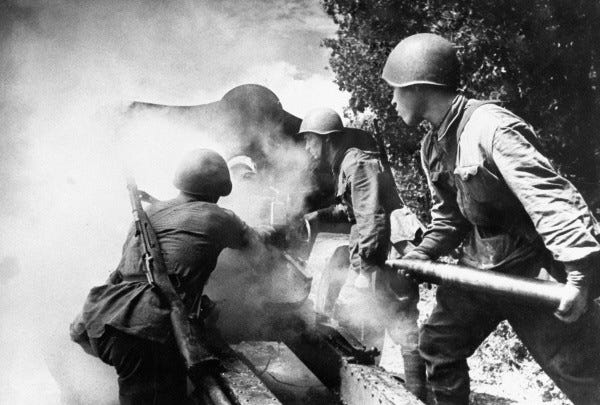Death approaches on the Eastern front
6 August 1941; A German soldier faces a skilful creeping artillery barrage


On the Eastern front many a German soldier realised that they still faced a hard fight ahead. Hitler’s belief that all they need do was ‘kick in the door’ and the whole Soviet system would collapse had proved woefully wrong. The Russians were proving resolute defenders even if they were poorly led and their tactics uncoordinated.
And there were still some very capable Red Army units in the field.
Hans Roth was keeping a diary of his experiences with the anti tank battalion - the Panzerjagers - of the 299th Infantry Division during Barbarossa. These are extraordinary detailed day to day accounts of the front line soldier at the time and the grim reality of the Eastern front:
6 August:
Heavy fire starts as expected around 0500 hours. I am sitting in B-position [beobachter, or observer] and am able to see our impending doom as no one else can. The sap [short trench dug from the front-trench] is right at the edge of the forest. From here, the terrain slopes gently down to the Weta River. That damn river looks like it will drink a lot of blood (perhaps mine too).
Behind the river is an enormous anti-tank trench filled with barbed wire. Well camouflaged bunkers line the trench. The firing is coming from them.
Death is rolling toward us. A crushing wall of fire crawls slowly, very slowly, up the hill. These schweine shoot with a precision that could have only been learned through intensive training.
Halfway up the hill, the fire-wall now reaches a tree-covered farmhouse. Cracking and splintering is heard when tree branches, wooden beams, and bricks go swirling through the air. The stinking fire-wall moves on.
Do not lose your nerves now, Hannes! I estimate that death will be arriving any minute now. Everybody has been warned. We claw our fingers into the dirt. We have sweat on our forehead out of fear. God. if we were at least able to defend ourselves! And then all hell breaks loose. There is a howling, an enormous roar, thundering, cracking, and the humming of thousands of splinters.
Foul-smelling smoke floods into our trenches. Did this last seconds or minutes? I cannot say. I pull my nose carefully out of the dirt to see that the firewall has moved on. I remain deaf for minutes. There is something wet on my face — blood! Thank goodness it is just a scratch.
Our position is in chaos. The tree trunks we used for cover have been torn to shreds. Portions of the trenches have been filled back up with dirt. One position received a direct hit. Two comrades were killed and three were wounded. Overall, we are lucky; it could have gone worse.1


